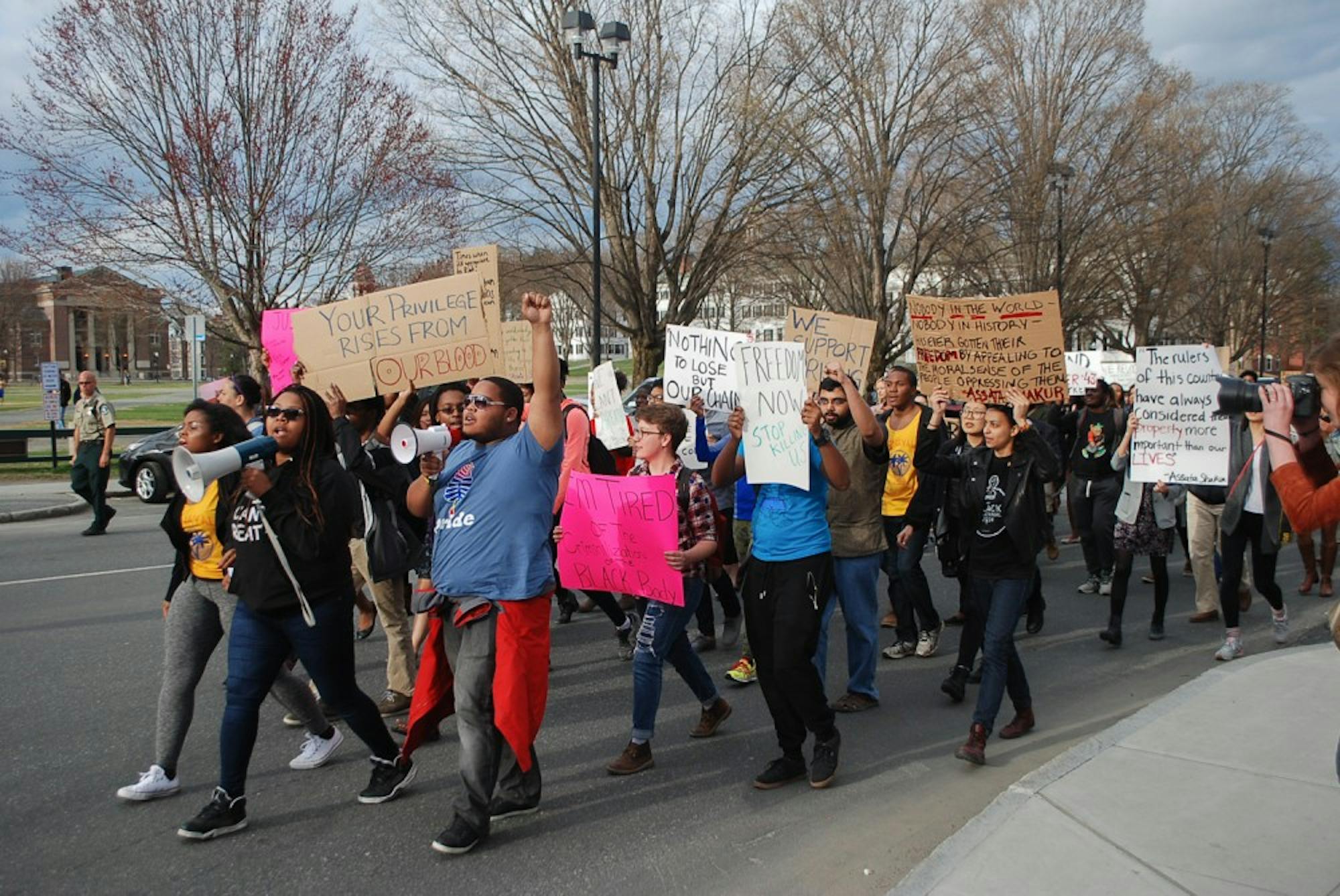College campuses have long fostered student activism through demonstrations, protests and critical conversations about contemporary issues. Dartmouth is no exception to this trend that dates back to the Vietnam War protests of the 1960s — the majority of activism on campus is driven by students’ desire to enact positive change within their community.
This past year, students at the College joined national conversations about sexual assault, police brutality and racial discrimination through organized demonstrations that supported these broader issues.
At the end of October students gathered on the Green carrying a mattress and pillows to express solidarity with survivors of sexual assault. The demonstration was inspired by Emma Sulkowicz’ senior visual art thesis at Columbia University. Sulkowicz reported being raped to the university administration in April 2013, but the disciplinary process found her alleged assailant not responsible. Her performance protesting the response, titled “Mattress Performance: Carry That Weight,” inspired a nationwide campaign at multiple universities to focus attention on campus sexual assault and inadequate responses by administration.
In December, over the winter interim period, Dartmouth students, faculty and Upper Valley community members led two separate demonstrations protesting the non-indictment of officers involved in the deaths of unarmed black men Michael Brown and Eric Garner.
The first was a Main Street rally on Dec. 4 organized by a group of Dartmouth faculty members. It drew a crowd of about 60 people, a quarter of which were students at the College who remained on campus during the interim period. The protest opened remarks from four Dartmouth professors — African and African-American studies professor Reena Goldthree, English professor Alexis Jetter, history professor Annelise Orleck and English professor Jeff Sharlet — who outlined the aims of the protest and connected the national issues to narratives of police brutality in the Upper Valley.
Despite the cold and snow, the rally ended with a die-in, where participants laid down in the snow for four and a half minutes to protest the four and half hours that Michael Brown’s body lay in the street in Ferguson, MO.
Geisel students organized a separate die-in at the medical school facilities, in accordance with the National White Coat Die-In, a movement let by medical students to stage similar events across the country in protest of the non-indictments. Nationally, the movement used the slogan “White Coats for Black Lives” to reflect the braoder meaning of the medical profession to do no harm.
Over the winter term, students marched through Baker-Berry library chanting “Black lives matter” and “We can’t breathe” before staging another die-in on the first floor of the library.
In the spring term, the geography department and African and African-American studies program introduced a new course titled “#BlackLivesMatter,” which was dedicated to looking at race, structural inequality and violence through both a historical and contemporary lens.
The class was taught by about 25 professors at the College from a wide range of departments, spanning anthropology, women and gender studies, English, history and mathematics, among others.
Geography professor Abigail Neely said that the course emerged from a desire to have critical conversations about national events in an academic context. She said that faculty considered multiple venues for having these conversations, such as panel discussions or workshops, but decided that an official course was the best way to have a deep, long-term engagement with students.
Neely said that despite the enrollment limit, which was capped at 30, the course aimed to foster dialogue with the broader community, both at the College and the Upper Valley. Part of the course grade involved a public engagement project, where students designed a presentation, workshop or teach-in to open the conversations in the class to a wider audience.
Neely said that the course was not intended to be a “how-to guide for being an activist.” Rather, she said it aimed to look at what was happening nationally through an academic lens, which she acknowledged could be frustrating as more instances of police brutality and violence emerged in the news as the term went on.
“What we do best at universities is that we have long-term investments in thinking about issues in a much broader historical and geographic context,” Neely said. “We’re here to think about things critically, to be deep thinking and to question the context under which we’re learning things. We do that to enable students, most of whom will not become academics but will go on to try and solve these problems, to solve problems better.”
On May 4, about 150 students carried posters with the phrases “We can’t breathe,” “Black lives matter” and “Where are our black profs,” among others, as part of a march in response to the death of Freddie Gray in Baltimore.
The next day, roughly 20 students gathered outside of Alpha Chi Alpha fraternity’s annual pigstick party, chanting “There are two Dartmouths, and they’re right here,” and “Single-sex organizations like your fraternity are part of the problem, Alpha Chi Alpha is part of the problem.” Some attendees left the party to join the protest.
The protesting students also stood outside of Kappa Delta Epsilon sorority that same day as it hosted its annual Derby event. Frank Cunningham ’16, the student body president-elect, was recorded shouting at a demonstrating student and repeating the phrase “I can’t breathe.” A petition calling for his resignation was circulated the same weekend — it drew 547 signatures. Cunningham later issued an apology to campus, acknowledging that his actions may have appeared threatening to the female student whom he had approached.
In response to the demonstrations, multiple undergraduate societies and Greek letter organizations hosted discussions to engage students in conversation about these issues. Alpha Theta coed fraternity hosted a “No Justice: No Peace” event the following Sunday where participants reached out to administrative bodies in Baltimore urging them to make just decisions moving forward. Alpha Phi Alpha fraternity also organized a discussion on the events of Baltimore.




